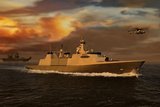Nordic firms team up on modular mine laying system
A rendering of a Cube system minelaying module. (Photo: SH Defence)
Denmark’s SH Defence and Finland’s DA-Group and Forcit Defence have signed a multi-party MoU to develop the use of The Cube system for launching, laying and storing sea mines.
The cooperation will use SH Defence’s The Cube system and explore the integration of mines, including the Blocker and Turso models.
The solution will be based on The Cube system's modular ISO frames and handling equipment and DA-Group’s Sumico naval modular minelaying concept.
DA-Group chief business officer Kristian Tornivaara said the collaboration would provide navies with a future-proof, modular solution for mine laying.
The Cube is designed to allow vessels to quickly and easily re-role between missions.
SH Defence area sales director Lars Gullaksen said: ‘This partnership with DA-Group and FORCIT allows us to jointly develop the multi-mission capabilities and expand the portfolio of payloads to include the most modern sea mines for the adaptability of both Scandinavian, NATO and other navies.’
Forcit Defence EVP Hannu Hytti said that recent developments in the security environment had emphasised the importance of sea denial and naval mine capabilities.
Hytti added: ‘With this partnership with SH Defence and DA Group we are able to provide world-class full-spectrum naval capabilities for maritime defence.’
More from Naval Warfare
-
![Raytheon unveils details of its proposal for the US Navy/NATO ESSM Next Significant Variant]()
Raytheon unveils details of its proposal for the US Navy/NATO ESSM Next Significant Variant
In an exclusive interview with Shephard, Raytheon’s VP of Shipboard Missiles disclosed what improvements the company plans to offer for the Sea Sparrow NSV.
-
![US Coast Guard Cutter Polar Star’s 50-year service highlights capability gaps in Antarctica]()
US Coast Guard Cutter Polar Star’s 50-year service highlights capability gaps in Antarctica
Delays in the construction of the Polar Security Cutter – the future substitute for the Polar Star – are likely to prolong the ageing icebreaker’s service time even more, putting the USCG in a risky position.
-
![As Indonesia doubles up its order, who else is looking at the Arrowhead 140 frigate design?]()
As Indonesia doubles up its order, who else is looking at the Arrowhead 140 frigate design?
The adaptable design of Babcock’s Arrowhead 140 frigate, already selected by the UK Royal Navy and Poland, has led to more orders from Indonesia while other countries continue to weigh it up.






















